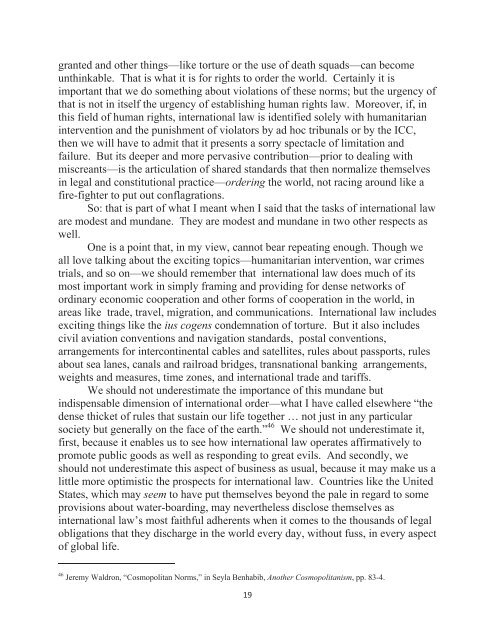International Legal Evangelism: Intelligence, Reconnaissance & Missions
International Legal Evangelism: Intelligence, Reconnaissance & Missions
International Legal Evangelism: Intelligence, Reconnaissance & Missions
You also want an ePaper? Increase the reach of your titles
YUMPU automatically turns print PDFs into web optimized ePapers that Google loves.
granted and other things—like torture or the use of death squads—can become<br />
unthinkable. That is what it is for rights to order the world. Certainly it is<br />
important that we do something about violations of these norms; but the urgency of<br />
that is not in itself the urgency of establishing human rights law. Moreover, if, in<br />
this field of human rights, international law is identified solely with humanitarian<br />
intervention and the punishment of violators by ad hoc tribunals or by the ICC,<br />
then we will have to admit that it presents a sorry spectacle of limitation and<br />
failure. But its deeper and more pervasive contribution—prior to dealing with<br />
miscreants—is the articulation of shared standards that then normalize themselves<br />
in legal and constitutional practice—ordering the world, not racing around like a<br />
fire-fighter to put out conflagrations.<br />
So: that is part of what I meant when I said that the tasks of international law<br />
are modest and mundane. They are modest and mundane in two other respects as<br />
well.<br />
One is a point that, in my view, cannot bear repeating enough. Though we<br />
all love talking about the exciting topics—humanitarian intervention, war crimes<br />
trials, and so on—we should remember that international law does much of its<br />
most important work in simply framing and providing for dense networks of<br />
ordinary economic cooperation and other forms of cooperation in the world, in<br />
areas like trade, travel, migration, and communications. <strong>International</strong> law includes<br />
exciting things like the ius cogens condemnation of torture. But it also includes<br />
civil aviation conventions and navigation standards, postal conventions,<br />
arrangements for intercontinental cables and satellites, rules about passports, rules<br />
about sea lanes, canals and railroad bridges, transnational banking arrangements,<br />
weights and measures, time zones, and international trade and tariffs.<br />
We should not underestimate the importance of this mundane but<br />
indispensable dimension of international order—what I have called elsewhere “the<br />
dense thicket of rules that sustain our life together … not just in any particular<br />
society but generally on the face of the earth.” 46 We should not underestimate it,<br />
first, because it enables us to see how international law operates affirmatively to<br />
promote public goods as well as responding to great evils. And secondly, we<br />
should not underestimate this aspect of business as usual, because it may make us a<br />
little more optimistic the prospects for international law. Countries like the United<br />
States, which may seem to have put themselves beyond the pale in regard to some<br />
provisions about water-boarding, may nevertheless disclose themselves as<br />
international law’s most faithful adherents when it comes to the thousands of legal<br />
obligations that they discharge in the world every day, without fuss, in every aspect<br />
of global life.<br />
<br />
46 Jeremy Waldron, “Cosmopolitan Norms,” in Seyla Benhabib, Another Cosmopolitanism, pp. 83-4.<br />
<br />
19

















